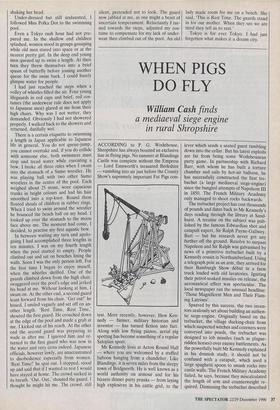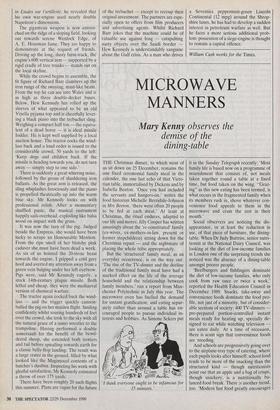WHEN PIGS DO FLY
William Cash finds
a mediaeval siege engine in rural Shropshire
ACCORDING to P. G. Wodehouse, Shropshire has always boasted an exclusive line in flying pigs. No summer at Blandings Castle was complete without the Empress — Lord Emsworth's treasured Berkshire — vanishing into air just before the County Show's supremely important Fat Pigs con-
test. More recently, however, Hew Ken- nedy — farmer, military historian and inventor — has turned fiction into fact. Along with low flying pianos, aerial pig spotting has become something of a regular Salopian sport.
Mr Kennedy lives at Acton Round Hall — where you are welcomed by a stuffed baboon hanging from a chandelier. Like Blandings, it is seven miles from the sleepy town of Bridgnorth. He is well known as a world authority on armour and for his bizarre dinner party pranks — from laying high explosives in his cattle grid, to the
lever which sends a seated guest tumbling down into the cellar. But his latest exploits are far from being some Wodehousean party game. In partnership with Richard Barr, with whom he has built a torture chamber and sails by hot-air balloon, he has successfully constructed the first tre- buchet (a large mediaeval siege-engine) since the bungled attempts of Napoleon III in 1850. The French Military Academy only managed to shoot rocks backwards.
The trebuchet project has cost thousands of pounds and dates back to Mr Kennedy's days reading through the library at Sand- hurst. A treatise on the subject was pub- lished by the famous Edwardian shot and catapult expert, Sir Ralph Payne-Gallwey, Bart — but his research never got any further off the ground. Resolve to surpass Napoleon and Sir Ralph was galvanised by news of a primitive trebuchet built by a Kennedy cousin in Northumberland. Using a telegraph pole as an arm, they arrived for their Bamburgh Show debut in a farm truck loaded with old lavatories. Igniting their petrol-soaked missiles on release, the aeronautical effect was spectacular. The local newspaper ran the unusual headline: `Those Magnificent Men and Their Flam- ing Latrines'.
Spurred by this success, the two inven- tors zealously set about building an authen- tic siege-engine. Originally based on the trebucket, the village ducking-chair from which suspected witches and cozeners were conveyed into ponds, the trebuchet was designed to lob missiles (such as plague- ridden horses) over enemy battlements. As the powerfully built Mr Kennedy explained in his donnish study, it should not be confused with a catapult, which used a large spaghetti spoon to smash rocks into castle walls. The French Military Academy failed, he says, because they miscalculated the length of arm and counterweight re- quired. Dismissing the trebuchet described in Etudes sur l'artillerie, he revealed that his own war-engine used nearly double Napoleon's dimensions.
The gigantean weapon is now entren- ched on the ridge of a sloping field, looking out towards serene Wenlock Edge, of A. E. Housman fame. They are happy to demonstrate at the request of friends. Driving up the long, dusty farm-track, the engine's 60ft vertical arm — supported by a rigid cradle of tree trunks — stands out on the local skyline.
While the crowd begins to assemble, the fit figure of Richard Barr clambers up the iron rungs of the swaying, mast-like beam. From the top he can see into Wales and is as high as three double-decker buses. Below, Hew Kennedy has rolled up the sleeves of what appeared to be an old Viyella pyjama top and is cheerfully lever- ing a black piano into the trebuchet sling. Weighing a compact half ton — the equiva- lent of a dead horse — it is ideal missile fodder. He is kept well supplied by a local auction house. The tractor cocks the wind- lass back and a loud order is issued to the considerable crowd, 50 yards to the left: `Keep dogs and children back. If the missile is heading towards you, do not turn away — simply step to one side.'
There is suddenly a great whirring noise, followed by the groan of shuddering iron ballasts. As the great arm is released, the sling whiplashes ferociously and the piano is propelled theatrically up into the warm blue sky. Mr Kennedy looks on with professional relish. After a momentary shuffled panic, the musical instrument happily sails overhead, exploding like balsa wood on impact with the grass.
It was now the turn of the pig. Judged beside the Empress, she would have been lucky to scrape an Honourable Mention. From the ripe smell of her blotchy pink cadaver she must have been dead a week. As six of us hoisted the 20-stone beast towards the engine, I gripped a cold grey hoof and averted my attention away from a green vein bulging under her left eyebrow. Pigs were, said Mr Kennedy eagerly, a stock 14th-century plague missile. Both lethal and cheap, they were the mediaeval version of chemical warfare.
The tractor again cocked back the wind- lass — and the trigger quickly cannon- balled the pig on her maiden flight. Smiling confidently whilst soaring hundreds of feet over the crowd, she took to the sky with all the natural grace of a sumo wrestler to the trampoline. Having performed a double somersault for the benefit of the bewil- dered sheep, she extended both trotters and tail before spiralling towards earth for a classic belly-flop landing. The result was a large crater in the ground, filled by what looked like the Magimixed contents of a butcher's dustbin. Inspecting his work with gleeful satisfaction, Mr Kennedy estimated a throw of over 175 yards.
There have been roughly 20 such flights this summer. Plans are vague for the future
of the trebuchet — except to recoup their original investment. The partners are espe- cially open to offers from film producers and advertising agents. Whilst Richard Barr jokes that the machine could be of valuable use against Iraq — catapulting nasty objects over the Saudi border Hew Kennedy is understandably sanguine about the Gulf crisis. As a man who drive,,
a Seventies peppermint-green Lincoln Continental (12 mpg) around the Shrop- shire lanes, he has had to develop a sudden interest in petroleum warfare as well. But he faces a more serious additional prob- lem: possession of a siege-engine is thought to remain a capital offence.
William Cash works for the Times.



































































































 Previous page
Previous page